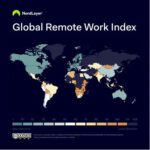 In a groundbreaking revelation, NordLayer’s Global Remote Work Index (GRWI) has identified the world’s top five nations excelling in cybersecurity, a crucial consideration for the burgeoning remote workforce. This pioneering research offers a profound glimpse into the future of work, where traditional office boundaries are rapidly dissolving, giving rise to new productivity and digital security paradigms.
In a groundbreaking revelation, NordLayer’s Global Remote Work Index (GRWI) has identified the world’s top five nations excelling in cybersecurity, a crucial consideration for the burgeoning remote workforce. This pioneering research offers a profound glimpse into the future of work, where traditional office boundaries are rapidly dissolving, giving rise to new productivity and digital security paradigms.
A New Era of Work
The emergence of remote work has redefined the workforce dynamics, as highlighted by Julia Hobsbawm, the acclaimed author of “The Nowhere Office.” She articulates, “Remote work transcends the dichotomy of isolation and collaboration. It manifests our ability to forge deep, meaningful connections through digital platforms.” This sentiment is echoed in the US workforce analysis, showing a dramatic shift from on-site to remote or hybrid work models between 2019 and 2023, primarily driven by escalating rental costs.
Cybersecurity: A Paramount Concern
Carlos Salas, NordLayer’s head of platform engineering, stresses the importance of cybersecurity in this new work landscape. “As we embrace hybrid work models, the pressing question is whether businesses are equipped to safeguard their operations,” he asserts. His insights are crucial, considering the increasing sophistication of cyber threats.
The Top Five Safe Havens
NordLayer’s meticulous assessment of 108 countries reveals the top five for cybersecurity, evaluated based on infrastructure, response capacity, and legal measures:
- Slovakia: At the heart of Europe, Slovakia leads in cybersecurity, offering a harmonious blend of work and leisure, thanks to its robust digital environment and appealing tourism prospects.
- Estonia: Known for its pioneering e-Estonia Programme, Estonia stands out for its digital services and cybersecurity, marking it a safe and advanced destination for remote workers.
- Lithuania: Ranking high in cybersafety and digital proficiency, Lithuania is an ideal choice for those seeking a secure, historically rich setting for remote work.
- Germany: With its top-tier internet affordability and groundbreaking IT Security Act 2.0, Germany offers a highly secure and cost-effective environment for digital nomads.
- Saudi Arabia: Distinguished in cyber safety, Saudi Arabia presents a unique choice, though it lags in social and economic safety and English proficiency.
Ensuring Remote Work Safety
Salas offers vital recommendations for businesses to secure remote work:
- Invest in reliable cybersecurity tools.
- Enhance cybersecurity protocols against threats.
- Educate employees on cybersecurity best practices.
- Improve remote access infrastructure with secure solutions.
Concluding Thoughts
This transformative era, marked by a shift towards remote and hybrid work models, underscores the critical role of cybersecurity. The insights NordLayer’s GRWI provided are informative and pivotal in shaping the future of work, where digital safety and flexibility are paramount. As the world adapts to this new normal, the countries leading in cybersecurity are set to become the hotspots for the next generation of remote workers.
For more details on the methodology behind the GRWI, visit NordLayer’s Methodology Page.
Written by: Don Power
















